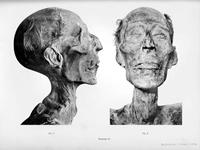This may seem like one of the great riddles of the universe. But what's really intriguing is what the bright gas and dark dust tell us about this nebula's star formation history. About 3,000 light-years away in the direction of Cepheus in the northern constellation Cepheus, at the edge of a giant molecular cloud, the star formation region NGC 7822 glows.
Inside the nebula, prominent bright edges and mysterious dark structures shape this colorful and detailed celestial landscape. Taken over 28 nights using an amateur telescope in Texas, the 9-frame mosaic was created with data from narrow-band filters. The image maps the radiation emitted by atomic oxygen, hydrogen and sulfur in blue, green and red hues, respectively.
The color combination known as the Hubble palette and the thematic line of the image are the hallmarks of this image. The light emitted by the atoms is driven by energetic radiation from the hot stars in the center. Strong stellar winds and radiation shape the denser pillar-like structures and erode them over time.
This process results in the formation of a vast light-year-scale void at the center of the cloud. Inside the dense pillars, new stars may continue to form through gravitational collapse. But as the pillars erode, these stars will eventually break away from the sources of matter they need. The image provides an impressive view of the estimated distance of NGC 7822, covering an area of more than 40 light-years.
October 13, 2021 Astronomy Photo of the Day (NASA APOD)
Image Source and Copyright: Yizhou Zhang


 Nielawore
Nielawore









Yorum yazmak için lütfen giriş yapınız